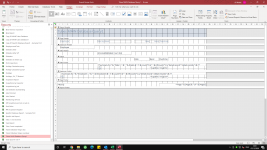Hi , this is my first post, so please forgive my ignorance and I hope I've put in in the right place!
I need to work out an average pay of an employee for the week. I've run a very basic report to try and show you what I mean.
This is all to do with calculating employees average pay over the last 52 weeks of full working weeks to enable us to calculate their holiday pay, but I can't even get past the first stage!
I basically want a average of their weeks pay over the number of days worked, however, they could've done 2,3,4... jobs in one day so I want Access to just work out the average if the date is different? Is that possible?
Thanks in advance...
I need to work out an average pay of an employee for the week. I've run a very basic report to try and show you what I mean.
This is all to do with calculating employees average pay over the last 52 weeks of full working weeks to enable us to calculate their holiday pay, but I can't even get past the first stage!
I basically want a average of their weeks pay over the number of days worked, however, they could've done 2,3,4... jobs in one day so I want Access to just work out the average if the date is different? Is that possible?
Thanks in advance...

